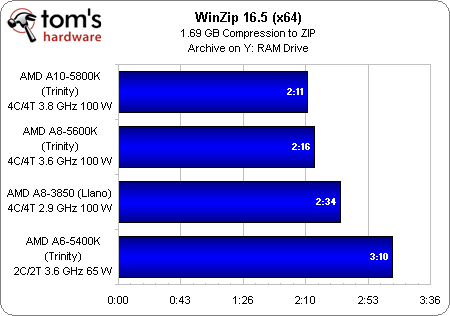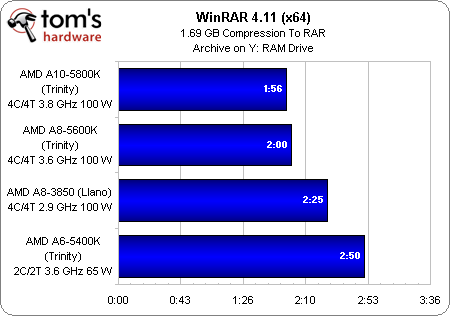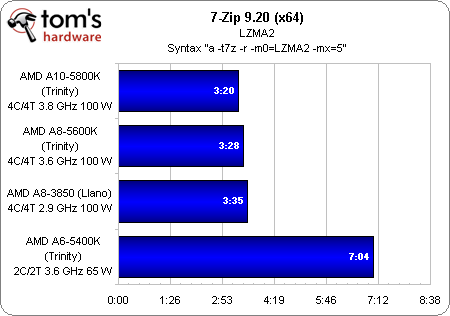AMD Trinity On The Desktop: A10, A8, And A6 Get Benchmarked!
Benchmark Results: File Compression
This one’s all-new. Corel revamped the WinZip engine, better-optimizing it for multi-core processors (in addition to exposing support for OpenCL on AMD GPUs, which we'll test shortly). We’re certainly not fans of a company using an open standard to lock out competition. Further, we know that AMD was instrumental in exposing this functionality, and that’s the justification given for preventing Intel or Nvidia from benefiting from it.
Nevertheless, there’s a clear improvement from Trinity compared to Llano in this integer math-dominant benchmark. The dual-core A6 suffers, as we’d expect.
Our more familiar WinRAR test also favors Trinity’s four integer cores over Llano’s quad-core configuration.
You can really look at results like these, along with WinZip’s, and see how big of a difference there is between apps that lean more heavily on integer-based code versus floating-point math. When you broaden the comparison criteria to include Intel, Trinity doesn’t look as stellar in WinRAR. However, if you’re lining it up against Llano, the speed-up is certainly measurable.
The outcome in 7-Zip is much closer, though at least the two Trinity-based APUs wind up on top (narrow though the victory may be). 7-Zip is clearly very well-threaded. Switching from the quad-core A10 and A8 to the dual-core A6 decimates performance. AMD marketing can say a lot of things about good-enough performance, but when you’re waiting an extra three or four minutes for a simple, relatively small compression workload to wrap up, there is unquestionably something to be said for owning hardware that’s better than passable.
Get Tom's Hardware's best news and in-depth reviews, straight to your inbox.
Current page: Benchmark Results: File Compression
Prev Page Benchmark Results: Media Encoding Next Page Benchmark Results: Batman: Arkham City-
Youngmind This is so exciting! AMD is probably going to dominate the lower-end and give the poor gamers like me more bang-for-buck as their IGP get better and better :)!Reply -
dudewitbow depending on how its priced, its a really nice alternative for bare budget gaming that opens up a quad core as wellReply -
So this means that a 'Crossfired' Trinity APU would beat ANY similarly-priced Intel (CPU+discrete GPU) ???Reply
Well at least in gaming -
dudewitbow JiggerByteSo this means that a 'Crossfired' Trinity APU would beat ANY similarly-priced Intel (CPU+discrete GPU) ???Well at least in gamingReply
really the question is what gpus are able to hybrid crossfire with it. the information was never public. not all amd gpus will hybrid crossfire with it. -
Well, where are the Ivy/Sandy i5's and i3's???Reply
Once they are pitted against each other, that will be A TRUE measure of the APU Trinity's marketability -
mayankleoboy1 in the OpenCL Winzip benchmark, when openCL is enabled the workload is done only by the iGPU or the CPU as well ?Reply
i mean what is the processor usage during the benchmark ? are all CPU cores used? or only one? -
cangelini mayankleoboy1in the OpenCL Winzip benchmark, when openCL is enabled the workload is done only by the iGPU or the CPU as well ?i mean what is the processor usage during the benchmark ? are all CPU cores used? or only one?Good question--I'll take a look for you.Reply



